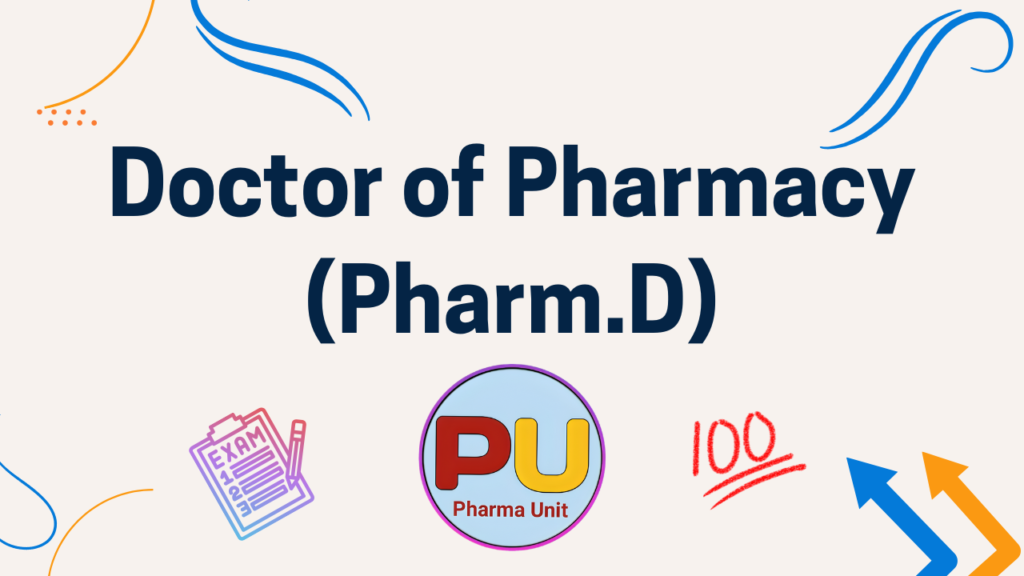Doctor of Pharmacy (Pharm.D) is a professional doctoral course designed to train pharmacists for clinical and hospital-based practice. Unlike B.Pharm and M.Pharm, which mainly focus on drug formulation, analysis, and manufacturing, Pharm.D focuses on patient care, rational use of medicines, and clinical decision-making. The course prepares pharmacists to work directly with doctors and patients, especially in hospital settings, where medication safety and therapeutic outcomes are critical.

What is Pharm.D?
Pharm.D is a six-year full-time program approved by the Pharmacy Council of India (PCI). It consists of five years of academic and clinical training followed by one year of compulsory internship in a hospital. The main objective of the course is to bridge the gap between pharmacy education and clinical practice. Students are trained to evaluate prescriptions, identify drug interactions, monitor adverse drug reactions, and counsel patients. Because of this strong clinical orientation, Pharm.D is considered the primary qualification for becoming a clinical pharmacist.
Eligibility Criteria for Pharm.D
Students can apply for Pharm.D after completing 10+2 with Physics and Chemistry along with Biology or Mathematics. Candidates who have completed Diploma in Pharmacy (D.Pharm) from a PCI-approved institute are also eligible. The minimum age for admission is seventeen years. Depending on the institute, admission may be based on merit or entrance examination. No prior degree such as B.Pharm is required for students entering directly after 10+2.
Duration and Training Structure
The total duration of the Pharm.D course is six years. The first five years include classroom teaching, laboratory work, and clinical exposure in hospitals. During these years, students are gradually introduced to patient care through ward visits, case discussions, and clinical postings. The sixth year is a full-time hospital internship, where students work under the supervision of clinical pharmacists and physicians. This structure ensures that students do not remain limited to theory but develop practical clinical skills.
Subjects Taught in Pharm.D
The Pharm.D curriculum includes subjects related to both pharmaceutical sciences and clinical medicine. Students study anatomy, physiology, pathophysiology, pharmacology, pharmaceutics, pharmaceutical chemistry, pharmacognosy, microbiology, and biochemistry in the early years. As the course progresses, greater emphasis is given to clinical pharmacy, pharmacotherapeutics, hospital pharmacy, clinical toxicology, pharmacovigilance, and drug interaction monitoring. These subjects are taught with a patient-oriented approach rather than a manufacturing or industrial focus.
Pharm.D Internship Training
The internship year is the most important component of the Pharm.D program. During this period, students participate in hospital ward rounds, review patient prescriptions, provide drug information to healthcare professionals, counsel patients, and assist in monitoring adverse drug reactions and therapeutic drug levels. This hands-on training helps students understand how medicines are used in real clinical situations and prepares them for professional practice as clinical pharmacists.
Career Opportunities After Pharm.D
After completing Pharm.D, graduates mainly work in hospital and clinical settings. They are employed as clinical pharmacists, drug information pharmacists, pharmacovigilance officers, and therapeutic drug monitoring associates. Pharm.D graduates can also work in clinical research, drug safety, regulatory affairs, and medical writing roles within the pharmaceutical industry. Teaching and research opportunities are available for those who wish to pursue academic careers or higher studies.
Opportunities Abroad for Pharm.D Graduates
Pharm.D is recognized in several countries, but working abroad requires clearing the respective licensing examinations. In countries like the USA, Canada, and Gulf nations, Pharm.D graduates must qualify for exams such as NAPLEX, PEBC, or DHA. Foreign practice is possible, but it requires additional preparation and cannot be considered automatic.
Who Should Choose Pharm.D
Pharm.D is suitable for students who are genuinely interested in clinical subjects and patient care. It is ideal for those who want to work in hospitals and collaborate with doctors in optimizing drug therapy. However, students whose primary interest lies in pharmaceutical manufacturing, quality control, or industrial production may find B.Pharm or M.Pharm more appropriate.
Read about MBA in Pharmaceutical Management.
